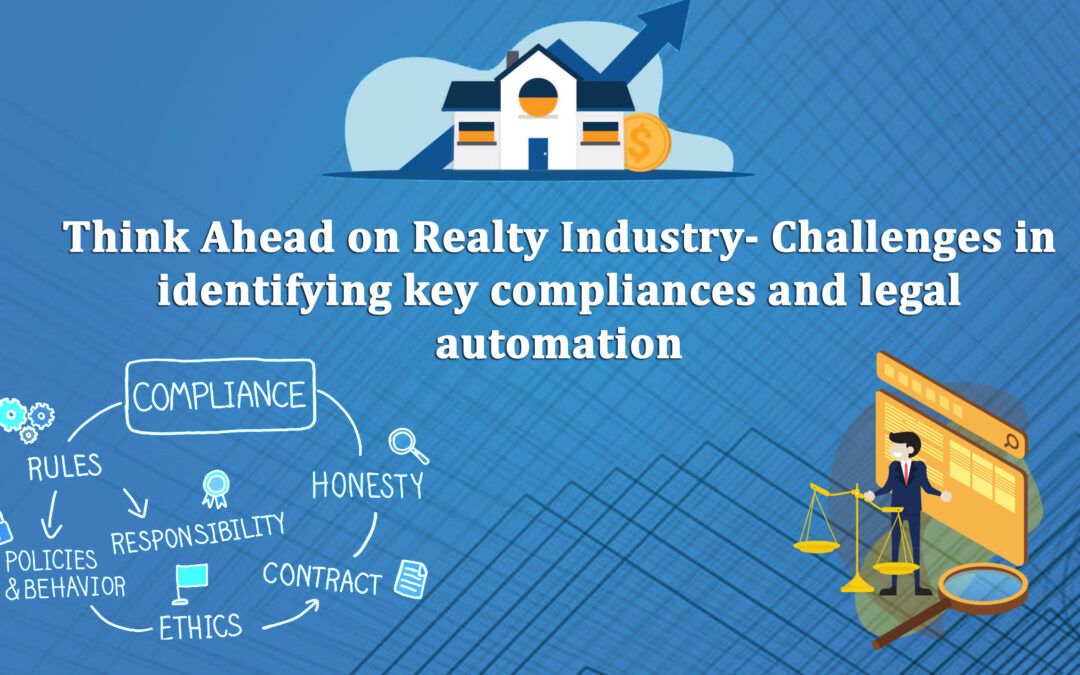Real estate being one of the oldest assets, refers to land as well as any physical property or improvements affixed to the ground, such as buildings, fences, wells, and so on. It can be characterized as land, building structures, air rights above the land, and subsurface or underground rights below the land. With the entry of several industries and corporations, India’s realty or real estate sector has seen significant expansion. Further, an increase in urban population has led to an increase in the demand for acquisition of real estate assets. This makes it essential for real estate business operators to keep a check of their regulatory compliance management system while operating in India, in order to ensure a smooth administration of all transactions concerning sale and purchase of real estate assets.
Is real estate a central or state subject?
The Indian Constitution under Article 246 categorizes “Land” as a subject matter of the State-List i.e., List-II of the seventh schedule of the constitution which implies that it is a subject matter upon which only the States can legislate. On the other hand, “transfer of property other than agricultural land” has been categorized as a subject matter of the Concurrent List i.e., List-III of the seventh schedule of the constitution wherein the power to legislate falls upon the States as well as the Centre. Therefore, since the realty or the real estate sector in India is regulated by central as well as state-specific laws it makes the regulatory compliance requirements and compliance management in this sector subjective and state specific to a large extent.
Major laws regulating the real estate sector in India
Real Estate (Regulation and Development) Act, 2016 (RERA): It establishes the Real Estate Regulatory Authority (RERA) for regulation and promotion of the real estate sector. The objective of RERA is to ensure that the sale of plot, apartment or building, or that of a real estate project occurs in an efficient and transparent manner and also to protect the interest of consumers in the real estate sector.
Right to Fair Compensation and Transparency in Land Acquisition, Rehabilitation and Resettlement Act, 2013: It provides guidelines with respect to land acquisition and states the rules pertaining to the rehabilitation, compensation and resettlement of affected persons while setting up any residential projects or commercial projects.
Urban Land (Ceiling and Regulation) Act: This legislation fixes a ceiling on the amount of vacant urban land that any legal entity may hold or acquire, over and above which is termed as excess vacant land which is to be surrendered to the authorized authority or developed for a special purpose.
Foreign Exchange Management Act, 1999 (FEMA) and Foreign Direct Investment Policy (FDI Policy): The FEMA and FDI Policy regulates any investment or transaction by the foreign entities in the Indian realty sector along with various compliances and exit of the investment.
Land Revenue Codes as formulated by various states: As discussed earlier, the realty or the real estate sector in India is regulated by central as well as state-specific laws. Therefore, several states have formulated their own land revenue codes that govern the division or classification of immovable properties in a state, rules relating to the transfer of such classes of property and the duties of revenue officers in respective states.
Registration of real-estate projects under RERA
Except for the state of Jammu and Kashmir, Real Estate (Regulation and Development) Act, 2016 has been enacted and implemented in all other states and union territories. Under section 3 of the Act, all commercial and residential real estate projects with more than 500 square metres of land under development or where the no. of units
to be constructed exceeds 8 apartments must be registered with the RERA authority before engaging in any kind of advertising, marketing, selling or offering for sale any apartment, building or plot, in any real estate project or any part of it.
Some of the important compliances for real estate companies are as under
-
Application for registration of real estate projects: Every promoter shall make an application along with the documents prescribed to the RERA Authority for registration of the real estate project as mentioned under section 4 of the Real Estate (Regulation and Development) Act, 2016.
-
Uploading the details of the proposed projection the website: Section 11 of the Real Estate (Regulation and Development) Act, 2016 states that Promoter upon registration of the real estate project shall create a webpage on the website of RERA Authority and enter all the details of the proposed project for public viewing as provided under sub-section (2) of section 4 of the Act.
-
Conducting quarterly updates with RERA: Every registered project is required to update the prescribed details regarding the project including list of number and types of apartments, approvals, etc on the website of RERA authority as mentioned under section 11 of the Real Estate (Regulation and Development) Act, 2016.
-
Complying with the proper process of booking and allotment as prescribed: Section 11 of the Real Estate (Regulation and Development) Act, 2016 further imposes several obligations and responsibilities on the developers which they must adhere to while allotting or booking of a new flat, some of them include:
-
Be responsible towards obtaining the completion and occupancy certificate from the relevant authority.
-
Making the approved sanction plans and layout plans available to the buyer or allottees.
-
Making available the stage-wise time schedule of the completion of the project.
-
-
Obtaining necessary insurance: The promoter of the project must obtain all the necessary insurances, as may be prescribed by the appropriate government as mentioned under section 16 of the Real Estate (Regulation and Development) Act, 2016.
-
Ensure proper transfer of title: The promoter shall ensure proper transfer of title under section 17 of the Real Estate (Regulation and Development) Act, 2016.
-
Formation of a society or association of the allottees: Section 11 of the Real Estate (Regulation and Development) Act, 2016 requires every promoter to form the society/association or co-operative society of the allottees. Unless otherwise provided by the State Government, such society must be constituted within 3 months of the majority of the allottees having booked their flats in the project.
-
Timely completion and delivery: Every promoter shall ensure timely completion and possession of the apartment, plot or building as per terms of the agreement of sale in case of failure of which, they shall return the amount or compensation on demand of the allottees as per section 18 of the Real Estate (Regulation and Development) Act, 2016.
-
Review of quality of the building: In case of any defects in the structure of the building or workmanship and other obligations of the promoter which are brought to the promoter’s notice within a period of five years from the date of handing over of possession, it shall be rectified by the promoter within 30 days of intimation without charging any additional cost as mentioned under section 14 of the Real Estate (Regulation and Development) Act, 2016.
What happens if we don’t comply with RERA?
The Real Estate (Regulation and Development) Act, 2016 provides for the penalties under Chapter VIII for non-compliance of its provisions by promoters, real estate agents and other parties under the Act.
-
For non-registration of the project with the RERA Authority: 10% of the total estimated cost of the real estate project. If any real estate agent fails to comply with the provisions of section 9 or section 10 of the Act or contravenes the same, he shall be liable to a penalty of ten thousand rupees for every day during which such default continues.
-
Where information or advertisement regarding the project is found to be false: Penalty for promoter is 5% of the estimated cost of the real estate project
-
Where any provisions of the Act have been contravened: Penalty for promoter is 5% of the estimated cost of the real estate project.
-
Where an order of the RERA has been contravened or has not been executed: Liable to a penalty for every day during which default continues after passing of the order which has been contravened extending up to 5% of the estimated cost of the real estate project for the promoter.
-
Where an order of the Appellate Tribunal has been contravened by the promoter: Imprisonment up to three years and fine for every day of default extending upto10% of the estimated cost of the real estate project.
-
Offenses by companies: Where an Offence under the Act has been committed by a company, every person who, at the time, the offence was committed was in charge of, or was responsible to the company for the conduct of the business shall be deemed to be guilty of the offence and shall be liable to be proceeded against and punished accordingly.
In addition to above there are several state-specific compliances which the players in the real estate sector may be required to adhere to. Hence one can conclude that all the players involved in the real estate sector in India are being governed by a variety of rules and regulations at the central as well as state level which makes compliance management for real estate businesses a highly cumbersome and complex affair. However, maintaining a regulatory compliance management system could help track all compliance requirements effectively in order to prevent any risk of deviation due to non-compliance.
With years of experience and commitment to keep corporates successfully establish a compliance management system in their organization, Lexplosion’s aim has always been to make law inclusive, that is to provide quality legal support, for businesses of all scale and sizes at an affordable cost. We have successfully managed to establish compliance culture across hundreds of organization including Fortune 500 companies. Our flagship Compliance Management Software Komrisk, have been adopted by few of the top notch real estate organizations. To read what they are saying about us click here.
For more information regulatory compliance management, get in touch with us now!
Written by: Nishtha Chakrabarti
Reviewed by: Soham Chaudhury
Disclaimer:
All material included hereinabove is for informational purposes only and does not purport to be or constitute legal or other advice. Professional legal advice should be obtained before taking or refraining from any action as a result of the above contents. We exclude any liability (including without limitation that for negligence or for any damages of any kind) for the content. We make no representations, warranties or undertakings about any of the information, content or materials provided hereinabove (including, without limitation, any as to quality, accuracy, completeness or reliability). The information provided herein has been taken from various sources such as government advisories, guidelines, circulars, departmental memos and other web-based sources of information. The content, including the design, text, graphics, their selection and arrangement, are Copyright 2021, Lexplosion Solutions Private Limited or its licensors. ALL RIGHTS RESERVED, and all moral rights are asserted and reserved.





